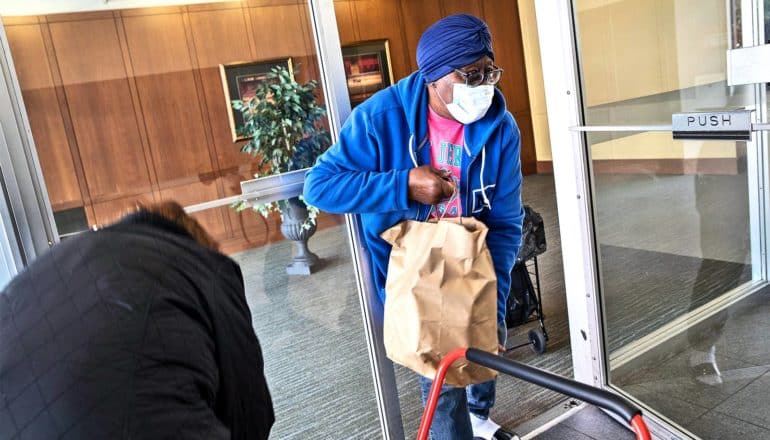
Even before the coronavirus pandemic, one in seven adults between the ages of 50 and 80 already had trouble getting enough food because of cost or other issues, a new poll finds.
The percentage of older adults who say they have experienced food insecurity in the past year was even higher among African American or Latino adults and those in their pre-Medicare years.
Older adults with lower household incomes and lower levels of education also had a higher likelihood of saying they had had trouble getting food.
Yet only a third of those with food affordability issues received government food aid for people with low incomes, called SNAP benefits or “food stamps” and less than 2% of those over 60 have received free meals served at senior centers or delivered to their home through programs like Meals on Wheels.
Disruptions to food supply chains, employment, and social services from COVID-19 may have worsened disparities, experts who designed the poll say.
The new results come from the National Poll on Healthy Aging, which involved a national sample of more than 2,000 adults aged 50 to 80 who answered a range of questions about their food security in December 2019.
Available help
“These data suggest an important opportunity, which is likely even more urgent now, to connect older adults with resources they may not know about, and to explore public policies that could improve access,” says Cindy Leung, assistant professor of nutritional sciences at the University of Michigan and a member of the Institute for Healthcare Policy and Innovation, who worked on the poll.
Julia Wolfson, assistant professor of health management and policy at the School of Public Health, notes the striking differences the poll reveals between those who said they hadn’t experienced food insecurity in the past year, and those who had.
“Food-insecure older adults were three times more likely to say they were in fair or poor physical health, and nearly five times as likely to say they were in fair or poor mental health,” she says.
Older adults with recent experiences of food insecurity were also twice as likely to say their diet was fair or poor. This could have further implications for their long-term health.
“Access to nutritious food and health status are closely linked, yet this poll reveals major disparities in that access,” says Preeti Malani, professor of internal medicine and assistant professor of nutritional sciences. Even as we focus on preventing the spread of coronavirus, we must also ensure that older adults can get food that aligns with any health conditions they have, so we don’t exacerbate diabetes, hypertension, digestive disorders, and other conditions further.”
“This research reaffirms that many older adults struggle to afford the food they need, and are not using available food and nutrition assistance programs,” says Alison Bryant, senior vice president of research for AARP. “The current crisis makes it even more urgent to ensure that our most vulnerable populations can access the nutrition they need.”
Getting food to older adults
Because of COVID-19 and temporary closures of senior centers and other places that served meals, the federal program that supports Meals on Wheels, and community food services for older adults has freed up money for more home delivery of meals, Malani says. And new programs to feed older adults have started at the federal and state levels.
For instance, the state of Michigan has established an expanded program for meal delivery thanks to the newly flexible funds. Similarly, the US Department of Agriculture, which oversees the Supplemental Nutrition Assistance Program or SNAP, has allowed states to apply for emergency waivers to make it easier for people to qualify for the program, or to stay on it.
AARP Foundation has provided grants to multiple programs that aim to reduce food insecurity, including Food on the Move, the Campus Kitchens Project, and funding for states to help seniors apply for nutrition assistance. In light of the coronavirus crisis, AARP recently called for Congress and USDA to provide a temporary increase in the maximum benefit and minimum monthly benefit for SNAP.
The National Poll on Healthy Aging results are based on responses from a nationally representative sample of 2,048 adults aged 50 to 80 who answered a wide range of questions online. The IHPI team wrote the poll questions and interpreted and compiled the data. Laptops and internet access were provided to poll respondents who did not already have them.
AARP and Michigan Medicine supported the work.
Source: University of Michigan
The post Many older adults faced food insecurity even before COVID-19 appeared first on Futurity.
from Futurity https://ift.tt/2YYqVCs
No comments:
Post a Comment